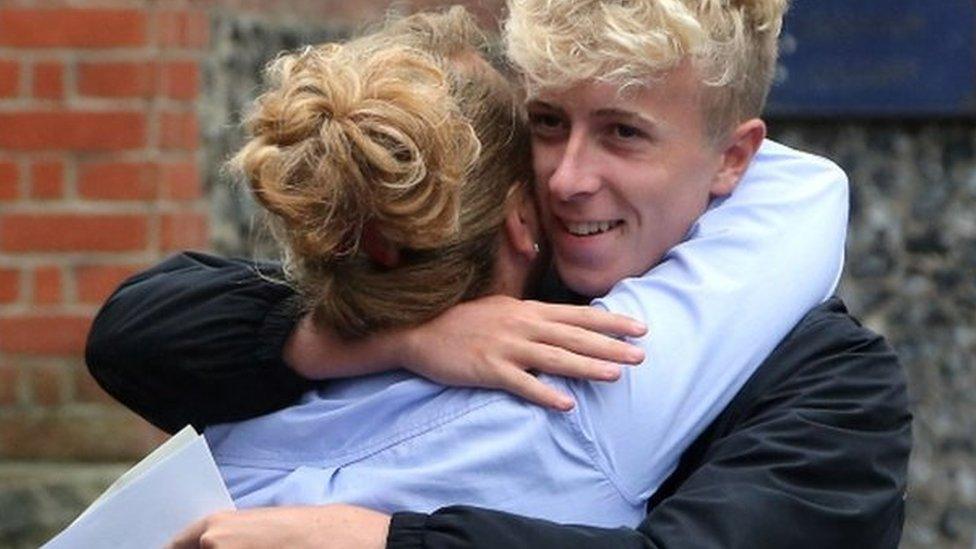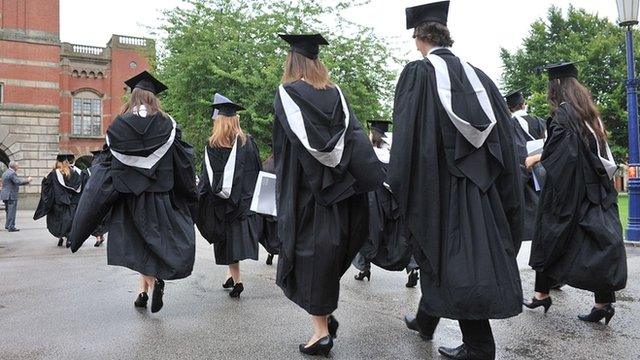Young people should 'think twice' about university - Frank Field
- Published

Frank Field chairs the Work and Pensions Committee of MPs
Students have been "mis-sold" degree courses and should choose apprenticeships, a Labour MP has said.
Frank Field warned students receiving their A-level results against pursuing "any old degree" and said vocational training could lead to better jobs.
He called for a rethink of careers advice given to 16 and 17-year-olds to avoid students being "sold a pup".
The government said universities "deliver extraordinary returns" for students.
Mr Field, a free-thinking former minister, who graduated from Hull university with a degree in economics, is chairman of the influential Commons Work and Pensions Committee.
In his article for the Times Educational Supplement,, external he wrote: "As we reflect on this year's A-level results, many sixth formers all over the country are mis-sold a graduate career, when the right advice, in terms of pay and happiness, is to take an apprenticeship.
"There is already a growing unease among young graduates who feel they have been ripped off."
He added: "This mis-selling scandal is so strongly embedded that it is countering any appetite across the country for alternative routes into jobs that pay decent wages and offer healthy prospects for progression."
Mr Field argued that apprenticeships could provide a better route into work for some school-leavers and they could earn more than some graduates.
"A large number of students have been sold a pup," he alleged.
Universities Minister Jo Johnson told Today that higher education remained good value for money
His comments follow recent criticism of the cost of degrees from Labour peer and former government adviser Lord Adonis, and Theresa May's former chief of staff Nick Timothy.
Mr Timothy has argued that successive governments had assumed that an increase in university graduates would boost economic growth, when technical qualifications were more likely to boost productivity.
However, an organisation which aims to help low-paid 16 to 30-year-old women out of poverty, criticised the way apprenticeships were offered to women.
"It's right that apprenticeships should be taken more seriously as an alternative to university degrees," said Carole Easton, chief executive of the Young Women's Trust.
"They have the potential to be a great route out of poverty and into fantastic careers. At present, however, gender stereotypes and a lack of support shut women out.
"While men are encouraged into industries like engineering and construction, women are expected to go into beauty, administration and care - where they are often paid less, given less training and are less likely to get a job at the end of their apprenticeship."
Speaking to the BBC as A-level results came out on Thursday, Universities Minister Jo Johnson said: "Universities continue to deliver extraordinary returns for people who go.
"On average, if you're a woman, you're likely to have higher lifetime earnings than women who don't go."

A government levy on employers aims to boost funding for apprenticeships
An association representing school heads rejected Mr Field's criticism of careers advice for teenagers.
"Schools work incredibly hard to prepare young people for whatever route they want to pursue," said Geoff Barton, general secretary of the Association of School and College Leaders.
However, he added: "Apprenticeships may be a more attractive option than university for many young people, particularly given the cost of university.
"So the more information we can give students about the range of options available, the better."
In April the government introduced a levy on employers to boost funding for workplace apprenticeships.
Labour has proposed allowing people to retrain for free at any point during their working lives.
Shadow education secretary Angela Rayner said: "Labour's national education service would provide free lifelong learning through further education colleges as well as abolishing university fees, so that everyone could benefit from different forms of education throughout their lives."
- Published17 August 2017

- Published17 August 2017

- Published17 August 2017

- Published21 July 2016

- Published31 January 2017

- Published25 October 2016

- Published18 October 2015
